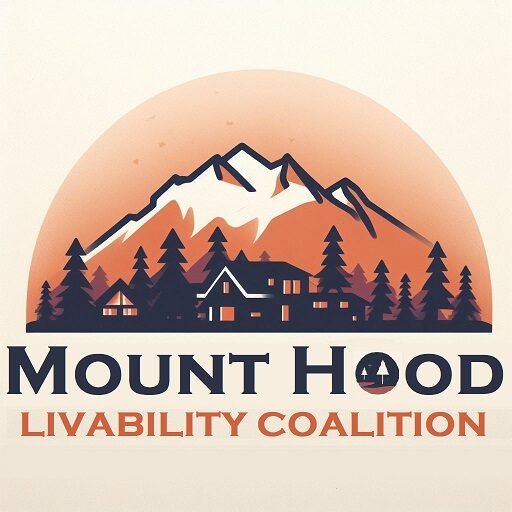Dear Mountain Community,
The Mount Hood Livability Coalition Board sent a letter in February to welcome the new commissioners and extend our greetings in hopes that we could open a dialog and focus their attention on what we feel is a failed STR Pilot Program. The two-year program expires in December 2025.
The origin of the Mount Hood Livability Coalition (MHLC) was a comment made by past Clackamas County Commissioner Chair Tootie Smith during the 2023 public hearings on the Short Term Rentals (STR) regulations. During public testimony by members of the Hoodland community, Chair Smith commented that our testimony might have an impact if we were an organized group of residents and businesses in our area. To that end, MHLC was created as a 501-c4 non-profit. We have over 100 supporters in the Hoodland area and work closely with the Hoodland CPO.
As a unified voice representing Hoodland community members, MHLC continues to focus on STRs’ impact on our communities. We are not anti-STR. We recognize that we live in an area the State and County promote as a tourist economy, and many locals with small businesses depend on it. Some STRs are generally good neighbors. However, many are mismanaged, and some are owned by investment corporations that are not local to the area and have no interest in our community’s livability, disrupting the lives of families in our neighborhoods.
Currently, there is no limit to the number of STRs allowed in the Hoodland/ Mt. Hood area. As all of us have experienced, STRs continue to proliferate, affecting the peaceful use of our homes, lowering the number of available full-time rentals, and increasing home prices. Many feel we live next to unstaffed hotel businesses in our residential neighborhoods. Limiting the number of STRs would enhance livability for residents by balancing the percentage of STRs to the number of occupied full-time homes.
In September 2023, the BCC finalized regulations designed to identify and regulate the STRs in the county. Our community was hopeful when the County passed the two-year pilot program for STR regulation. Citizens in the Hoodland area have asked the county for regulations/rules since 2014. Here is a summary of how the two-year Pilot Program has fared on the issues after a year.
- When we learned that the Finance Department would administer the regulations, we realized that collecting the Transient Lodging Tax (TLT) would be their main priority. Managing neighbors’ complaints seemed like a second thought.
- A series of false starts during the selection of a software program management company delayed the start date by six months.
- The administrators made extensive publicity efforts to communicate that all STRs should be registered (likely to collect TLT and program tax). However, they did little to publicize the STR complaint form online or a phone number for neighbors who needed immediate help with problem STR guests or owners next door.
- We know that many homes operating as STRs have not yet been identified and registered by the program administration and, therefore, are not paying the lodging tax or program fee. For example, a community member reports an unregistered STR to the County program. Months later, it continues to be unregistered. Why? There are no consequences to the owner for non-compliance, as the County can’t suspend the registration number of the STR because it doesn’t exist in their records.
- The program has failed by not enforcing the most basic STR Program requirements—registering all STRs using a program-issued number on booking sites and advertisements and placing ID signage on the road with 24/7 contact information.
- The complaint form on the County STR website functions, but users who have requested that they be informed about the follow-up to their complaint have not been contacted. Community members tell us they have made the same complaint several times, yet the violation continues. Many community members no longer even try to use the complaint form because the County has no resolution as the violation continues. The program administrators told MHLC they were sending letters, but our requests to see evidence of the letters were declined.
- The County has told MHLC that they have NO provision or authority to enforce the rules, even though the actual law passed by the County says in County Code 8.10.080 Administration and Enforcement, “For acts of noncompliance, the Department of Finance shall administer, supervise, and perform all acts necessary to enforce this chapter or any other chapters of the Clackamas County Code applicable to short-term rentals.” And in code 8.10.090,” Violation of this chapter shall be punishable by suspension or revocation of a short-term rental registration, and/or by a penalty or fine in an amount set by resolution of the Board of County Commissioners.”
As the County embarks on the final months of the pilot program, the Mt. Hood Livability Coalition would like to make the following recommendations:
Each month, the Department of Finance administrators will provide our community via the MHLC contact with a list of complaints, letters they have sent addressing those complaints to the manager or owner, and a list of results. Our community needs to know that our complaints are resulting in action. We also request that a complete list of all registered STRs in Hoodland be released to MHLC.
In our letter, we requested an in-person meeting with the Board of Clackamas County Commissioners and the Administrator of the STR program regarding these concerns. We will include a request to enforce County Code 8.10.080 and Code 8.10.090 (see above). In anticipation of the end of the STR Registration Pilot Program in Dec. 2025, we will be preparing plans for a more effective, permanent solution. We will be asking our community for help with these plans. We can’t do it without you.
Sincerely,
The Mt. Hood Livability Coalition

